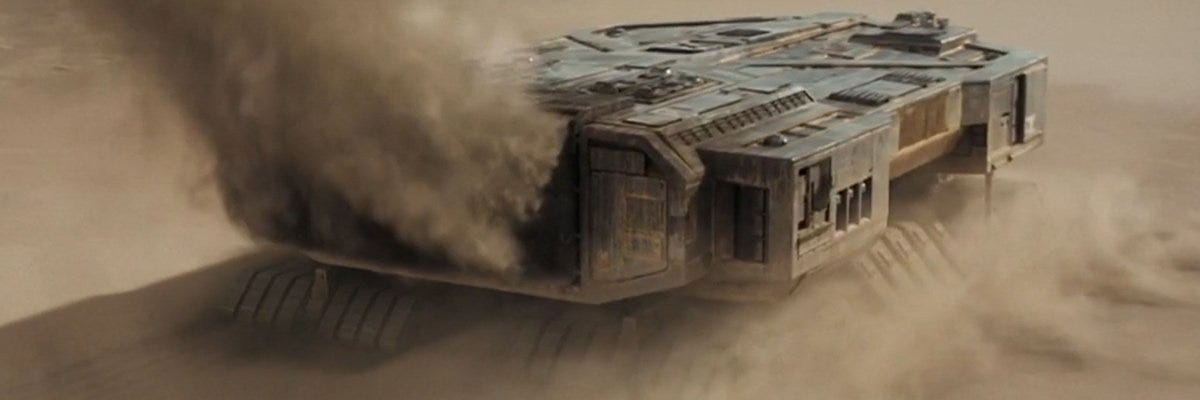GROSS DISTRACTION - Villeneuve's Dune - aristocratic excess
The distant future is nasty, brutish and so much sand in your picnic.
Pre-modern social structures, absolute monarchies, divine right, brutal imperial regimes, feudal and slave economies, war and more war (with swords). What is it about the space-opera form, the grandest, galaxy-spanning form of sci-fi, that requires these antique social patterns? Superstition, secret societies, monastic discipline, religious sects that can see the future, the past and also deep into your soul.
Part one, 2021
It’s 155 minutes long. Hardly anything happens (I could give you the plot in about four lines). The big stars say hardly anything. Everyone whispers against thunderous sound design that makes knowing what's going on quite hard. In fact if there was anything going on it would be impossible. Luckily there's hardly anything going on. And this almost empty plot is the film's primary merit. We drift through it untroubled by events. It's a mood piece (I've since learnt that all the action is in the sequel).
There are sci-fi epics that don't have the dynasties and warrior races and priesthoods and exotic, masked tribes - Kim Stanley-Robinson's (slightly worthy) future bureaucracies and floating anarcho-ecological cities; Liu Cixin's hyper-pragmatic inter-stellar states - but Dune is definitely in the Mediaeval/Roman Empire category.
No aliens here
We're in a complex, colonial state. I say complex because this is one of those situations where the more recent colonists are in competition with earlier settlers who come from the same place - and the same species. This is not an Avatar situation. Indigeneity is not the issue - only relative indigeneity - like here on Earth. Only the worms (and the little mice with the big ears) are indigenous.
Herbert, in the books, conspicuously refuses the opportunity to populate these worlds with sentient aliens - you will meet none at all in the whole 23-book series - but that doesn’t mean there’s no other. On Arrakis it’s the Fremen, a race that resembles the Indian tribe in a progressive Western. They live in harmony with the harshest environments, have an animistic connection with nature and are naturally warlike. They charm the mysterious, giant worms and recycle their sweat (and the fluids of their dead) to drink. They crouch in the dust and contemplate their place in the food chain.
So a lot of the conflict here boils down to genetics. It’s one bloodline (or House) against another or one bloodline in service of another. These are not Westphalian states (equal and sovereign) or even Benedict Anderson states (limited and sovereign). If they’re states at all, they’re ethno-states, territorial blocs strictly (and brutally) defined by bloodline. And bloodline here is as vague as you’d expect, although ethnicity is apparent. One ‘nation’, the Harkonnen, is white - and when I say white, I mean luminous, veinous white, like a hairless chihuahua or something.
The Fremen are swarthy and coded as Bedouin Arab (or possibly Mujahideen). They pray on rugs and their language is approximately semitic. The emperor’s people - the Atreides - are perhaps the most conventionally European - their outfits could pass for court costume in Renaissance Florence. Some of them harbour sensitivities and have something resembling conscience. They’re enlightened.
The superiority of this bloodline over that one is self-evident, bloodlines have their own immutable characteristics. They’re stupid but fierce; in-tune with nature but superstitious; noble but possibly a bit too trusting. If there are any peace-loving bloodlines in the empire we don’t meet them - presumably eliminated by one of the warlike lot.
It’s the resource economics, stupid
We're deep into a technologically-advanced future where there's faster-than-light travel and vast power is available instantaneously (spaceships the size of Manhattan hover a foot off the ground just because they can). And there's a vastly profitable extractive economy. The Empire is a kind of militarised OPEC for spice - a hallucinogen that also, conveniently, enables instantaneous travel across any distance and is only available on Planet Arrakis. There's a lot of talk about income. People die because they fail to meet their extraction targets, not just because of inadequate fealty to the Space Baron. The leaders of the various blocs are dictators but also managers and entrepreneurs.
The crisis on Arrakis - the resource-rich planet on which both Dunes are principally set - is as much an economic crisis as it is an insurrection. It’s not explained in any detail but it’s evident that the attacks by the tribal Fremen - who inhabit the harshest desert environments on the planet - on harvesters and stockpiles, have raised the cost of extraction and the risk profile of the whole operation sharply. It’s uninvestable and uninsurable. There’s quiet panic in the hierarchy. You sense the pressure of a stock market or an investor committee behind all this. Miss your next quarter’s numbers and you’re worm food. The only solution is harsh repression and, in fact, slaughter, for the Fremen, who consider it their job to protect the planet and the spice. But the Empire has bitten off more than it can chew.
Part two, 2024
The second episode is a seamless continuation of the first but busier. The blessed calm of the first half is gone. Everything has gone pear-shaped. Everyone shows up on the troubled planet Arrakis at once. Coherence goes out the window. Everything about the second film is more chaotic: the edit is choppy, frankly weird - it looks like longish explanatory passages have been dropped (for the director’s cut?). We lurch from event to event as if through narrative wormholes. Blood is shed, things are blown up. And there’s more of that sense that this is actually, at base, a corporate crisis - that the invading horde might be shareholder activists, calling in a promise.
In the story, there’s a vast imperial betrayal that sees an entire bloodline (almost) eliminated. A theme about religious fundamentalism is developed. One of the colonists - a holy woman of the ancient Bene Gesserit sect - plans to win over the Fremen - the tribe that controls access to the spice - by cynically converting them to an extreme version of the faith of her social elite, which is a secretive, matriarchal Abrahamic-Shamanist hybrid: veiled women, trances, acquiring wisdom via pain and so on. But this is obviously not a good faith. It’s a cynical, bad-faith faith, with a hyper-pragmatic elite concerned only with power, territory and domination. They have spent millennia acquiring superhuman powers - ‘the voice’ gives them instant control over others - but there’s no magic here. The Bene Gesserit are like a malign Derren Brown. It’s a pastiche of mediaeval European religion - an elite faith embedded in the exploitive fabric of monarchy and feudalism.
Aristocratic excess
Decisions seem to be made either by the monarch or by a very narrow elite - there’s mention of a ‘council’ but no evidence of any democratic institutions at all, only subjection, arbitrary brutality (so many menial throats are cut), accumulation and primitive loyalty based on those bloodlines. It's more than a bit depressing to see a civilisation that we're meant to understand is our own but thousands of years along the timeline, in which not a single enlightenment idea has survived.
You have to wonder: at what point, in the passage of about 8,000 earth years, did humanity abandon all of the advances - bourgeois, liberal and democratic - won in the three or four hundred years before the first space flight? And what was it that finally caused liberal humanity to die out? Was it the brutal, zero-sum economics of space travel itself? Is it just not possible to project humanist values across the void of interstellar space without falling back to a state of nature?
Presumably, if departure from Earth is ever possible - and reproducible at scale with more than a handful of psychologically-profiled superhumans on-board - economic and social models will be imposed or will emerge. If Musk and Bezos and the growing class of Tech Space Barons get to shape them, there's obviously a risk it'll be ghastly frontier hyper-capitalism. Like the Mars of Total Recall. Oxygen is available but only if you have the credits. The prison deck is bigger than the hydroponic farm. I'm not optimistic. But maybe there'll be fierce, anti-capitalist worms.
Dune and Dune 2 are both on Amazon Prime Video. There are Blu-Rays: Dune and Dune 2.
Will future space travel be collegiate, cooperative, a collective enterprise for all of humanity? No. It will be a shitty, dispiriting fight to the death. Evidence? Elon Musk’s ridiculous feud with Boeing.
“There’s plenty of time for life to travel across the galaxy. There’s really nothing in principle that would limit the spread of life and mind, right across the cosmos, so that conjures up the alternative image of the universe in the very far future, saturated with mind…” Paul Davies, Physicist and (very) futurist.
The Fremen may have been reading the preserved scriptures of Andreas Malm, a Swedish historian and activist who advances the idea of a ‘climate Leninism’ in which the violent destruction of the machinery of the climate crisis - refineries, pipelines, SUVs and so on, is not only advisable but necessary. His book How to Blow up a Pipeline is a succinct summary of the thesis. His Fossil Capital could be read as an explanation of the resource-driven economics of Dune.
On YouTube you can watch the Chinese TV version of Liu Cixin’s Three-Body Problem. It’s a careful, almost pedantic 30-part adaptation (and this is just book one - there are two more to come) and I’ve been trying to put my finger on why it’s so interesting. There’s something about the objectivity, the earnest, uncynical effort to truthfully translate the book for video. It’s respectful of the novel in a way you definitely can’t say about the Netflix version.
Back to the sequence of top-grossing movies next week and it’s an interesting one - from a category I’ve never heard of. It’s a ‘sex hygiene’ picture called Mom and Dad, from 1945.










1. Why swords and knives in a future where people and space ships can defy gravity?
2. What does everyone eat on Arakis, mice and worms? If so, what do the mice and worms eat?
3. Why don't the Fremen just sell the Spice and live large like the Saudis and Gulf State Arabs do with their oil wealth - no more war. Of course then there would be no story either.